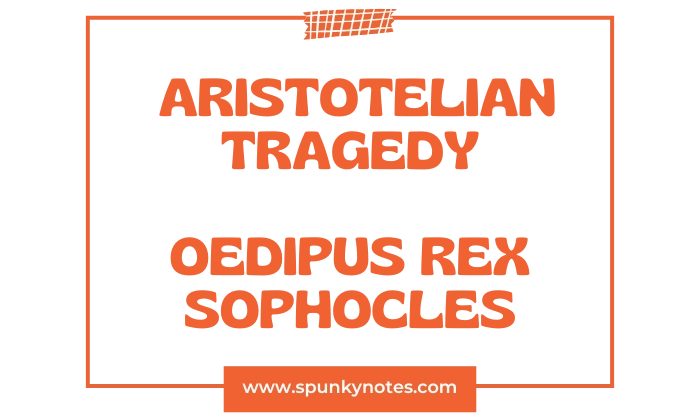

Estimated Reading Time: 9 min
Q. Critically examine “Oedipus Rex” as a model of Aristotelian tragedy. How does it exemplify the key elements of a perfect tragedy as defined by Aristotle in his Poetics?
Oedipus Rex as an Aristotelian Tragedy
Sophocles’ Oedipus Rex is widely regarded as a prime example of a perfect tragedy, as outlined by Aristotle in his Poetics.
Aristotle frequently cited this play as an exemplary work, particularly highlighting its well-structured plot and its portrayal of a tragic hero who suffers misfortune due to a significant error.
The Elements of Tragedy in Oedipus Rex
• The Tragic Hero
• Hamartia (The Tragic Error)
• Peripeteia (Reversal of Fortune)
• Anagnorisis (Recognition or Discovery)
• Catharsis (Purging of Emotions)
• The Three Unities (Time, Place, and Plot)
The Tragic Hero and Hamartia
At the core of Aristotelian tragedy is the tragic hero, who, like Oedipus, experiences a downfall not primarily due to vice or depravity, but because of a hamartia, an error or mistake. The nature of Oedipus’s hamartia is a subject of significant scholarly debate.
There are two main interpretations of hamartia:
1- Innocent Mistake based on Ignorance
One view suggests that Oedipus’s hamartia was an innocent mistake stemming from a lack of crucial information. He unknowingly killed his father, Laius, and married his mother, Jocasta.
Oedipus himself states his actions were done “not knowing what I did“. His search for the killer of Laius began with the highest motives: to cleanse the city from plague and prevent himself from becoming the next victim.
The oracle given to Laius declared his child would cause his death, but he was killed by strangers “where a wagon trail divides“. This highlights the element of tragic irony and Oedipus’s unwitting fulfillment of the prophecy.
2- Flaw in Character
The opposing view contends that hamartia refers to a mistake arising from a character flaw, such as pride or anger. Throughout the play, Oedipus displays a tendency to lose his temper and jump to conclusions.
For instance, he quickly becomes convinced that Tiresias and Creon are conspiring against him, accusing Tiresias of planning the murder of Laius.
He even threatens Creon with death or banishment, stating, “Oh no! I’d have you die, not merely flee—to demonstrate how evil envy is“.
His violent encounter at the crossroads, where he killed Laius and his entourage, can be seen as an example of his intemperate behaviour.
The text leaves ambiguity regarding “how much force” Laius’s party used against Oedipus, making it unclear whether his actions were purely self-defense or an indulgence of excessive anger.
The chorus’s famous line, “Hubris breeds a tyrant“, further connects to this interpretation, suggesting that Oedipus’s arrogant disregard for moral constraints might be a contributing factor to his downfall.
However, this line itself is open to interpretation, possibly applying to Athens’ imperial power or ambitious politicians rather than directly to Oedipus’s actions, or as a warning to him.
Oedipus Rex is widely regarded as a pivotal example of classical tragedy, particularly in its masterful incorporation of peripeteia, a sudden reversal of fortune, and anagnorisis, a recognition or discovery.
Reversal of Fortune (Peripeteia)
Oedipus’s journey is a profound and complete reversal of fortune, moving him from the pinnacle of societal esteem to the depths of despair and degradation.
At the play’s opening, Oedipus is presented as Thebes’ revered saviour and “lord and master“. He is not merely a king but a “celebrated man called Oedipus” who previously “rescued Thebes from paying the cruel musician’s deadly tax” by defeating the Sphinx.
His past triumph has imbued him with an unshakeable confidence, evident in his initial declaration regarding the plague: “Then I’ll uncover all of it again“.
He assumes the mantle of investigator with certainty, vowing to “join the righteous fight to help the country’s cause and serve the god“, even seeing personal benefit in it.
Whoever murdered Laius might decide to lay his violent hands on me as well.
I stand to benefit from doing this.
However, the very investigation he initiates to save his city systematically dismantles his own identity and fortune. What begins as a civic duty transforms into a relentless uncovering of horrific personal truths.
By the play’s conclusion, this once-celebrated ruler has become a blind, self-exiled wanderer, a “human being the gods detest“.
He is left broken and outcast, physically mutilated and socially condemned, begging Creon to “Make me an outcast now, exiled to where I’ll never meet another human being“.
The chorus showed this profound reversal:
Everyone who looked on him was jealous of his fate.
What a flood of grim misfortune overwhelms him now!
Recognition (Anagnorisis)
The play’s brilliance lies in its series of anagnorises, or discoveries, which gradually unveil the horrifying truth of Oedipus’s identity and past actions.
These moments of recognition are not instantaneous but are painstakingly revealed, building dramatic tension and deepening the tragic impact.
Tiresias’s Initial Revelation
The first hint of the truth comes from the blind prophet Tiresias. Under Oedipus’s aggressive questioning and accusations, Tiresias is forced to reveal the unthinkable:
The murderer you’re looking for is you!
He further condemns Oedipus, stating,
Your closest ties bring infamous disgrace.
You dwell in evil, you’re too blind to see.
Oedipus, however, fuelled by his quick temper and suspicion, dismisses this as a conspiracy concocted by Creon, failing to recognise the truth due to his own “volitional ignorance”.
Jocasta’s Unwitting Clues
The next crucial step in Oedipus’s recognition occurs when Jocasta, attempting to comfort him by discrediting oracles, inadvertently provides details of Laius’s death. She recounts that:
An oracle once came to Laius…declaring that whatever child was born to him and me would cause Laius’s death; but he was killed by strangers, so we’re told, some robbers, where a wagon trail divides.
She describes Laius’s appearance: “A tall man, rather similar to you“, and his entourage:
He took a single carriage.
Five in all, counting the herald.
These details immediately strike Oedipus, causing him to feel “dizzy” and for his “thoughts [to be] racing everywhere”.
He exclaims, “Ah-ahh! I may have placed an awful curse upon myself, not knowing what I did“, marking the terrifying dawn of suspicion.
He recalls his own violent encounter at a crossroads, where he “slaughtered everyone” in Laius’s party after being struck.
The Corinthian Citizen’s Revelation
The most devastating series of recognitions begins with the arrival of the Corinthian citizen.
Initially, his news of Polybus’s death brings relief, as it appears to invalidate the prophecy that Oedipus would kill his father.
However, the citizen then reveals that Polybus and Merope were not Oedipus’s biological parents: “You’re not related, Polybus and you“. He explains that he “found [Oedipus] in the wooded glades of Citheron” as an infant, having received him as a “gift” from “Laius’s man”.
The tell-tale sign was Oedipus’s feet:
You ought to let your ankles testify.
You lay with ankles pierced. I set you free.
This explains his name, “Oedipus,” meaning “Swollen-foot”. This revelation pushes Oedipus further down the path of horrific discovery.
Laius’s Man’s Final Confession
The climax of anagnorisis occurs when Laius’s man, the sole survivor of the crossroads attack and the shepherd who abandoned Oedipus as a baby, is brought before him.
Under Oedipus’s threats of torture – “If kindness doesn’t make you speak, there’s pain. …Will someone hold his arms?” – the old servant reluctantly confesses the horrifying truth.
He admits the child was Laius’s, given to him by Jocasta herself with explicit instructions to “Do away with him” due to the prophecy that he would be his father’s murderer.
Oedipus’s Full Realisation
This final, crushing piece of the puzzle triggers Oedipus’s complete and agonizing anagnorisis. He cries out:
Aa-ahh! Now everything’s becoming clear! O light—the last I’ll ever see, I stand exposed, all wrong in parents, those with whom I lived and him I murdered, wrong, all wrong!
This moment is the devastating fusion of his recognition and the ultimate reversal of his fortune. His identity as Thebes’ saviour collapses, replaced by the horrific truth of his patricide and incest.
The mixing of peripeteia and anagnorisis moments creates a deeply impactful tragedy. The relentless pursuit of truth by Oedipus, driven by his virtuous desire to save Thebes.
It paradoxically leads to the discovery of his own monstrous reality and his catastrophic fall.
The Purpose of Tragedy (Catharsis)
Aristotle believed that a tragedy should make the audience feel strong emotions like pity and fear. He called the release of these feelings catharsis, which is like an emotional cleansing.
The events in “Oedipus Rex” are designed to create this powerful emotional response. The audience watches Oedipus’s horrific act of self-blinding.
He takes the gold pins from his dead mother’s dress and stabs his own eyes until they bleed. This shocking scene evokes pity for his terrible suffering. It also evokes fear in us because we see how fragile human life can be.
The Chorus on stage cries about Oedipus’s “dreadful suffering,” which adds to the emotional impact. The final lines of the play serve as a warning.
Native residents of Thebes, consider Oedipus, one who solved the famous riddle, mightiest of men.
Everyone who looked on him was jealous of his fate.
What a flood of grim misfortune overwhelms him now!
Thus we learn how necessary seeing the final day is for judging mortals blest.
Otherwise refrain. Happiness means ending life without being crushed by pain.
The Three Unities (Time, Place, and Plot)
“Oedipus Rex” follows three classical rules for drama known as the Three Unities. These rules help make the play feel very focused and intense.
Unity of Time: The entire story of the play happens within a single 24-hour period. This short timeline increases the tension as Oedipus’s dark past is revealed very quickly.
Unity of Place: The play is set in only one location: the front steps of the palace in Thebes. This single setting keeps the focus on the royal family and shows that Oedipus cannot escape his fate.
Plot Structure (in medias res): The play begins “in the middle of things” (in medias res). When the story starts, a plague is already destroying the city, and Oedipus has been king for many years.
We learn about past events, like the murder at the crossroads, through character dialogues. This technique slowly unfolds the backstory, which builds suspense and makes the final discoveries even more shocking.
In summary, “Oedipus Rex” is a perfect model of a Greek tragedy. It features a great tragic hero who suffers a downfall because of a significant mistake.

